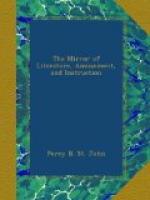John Leland, the father of the English antiquaries, was born in London, about the end of the reign of Henry VII. He was a pupil to William Lily, the celebrated grammarian—the first head master of St. Paul’s school; and by the kindness and liberality of a Mr. Myles, he was sent to Christ’s college. Cambridge. From this university he removed to All Souls, Oxford, where he paid particular attention to the Greek language. He afterwards went to Paris, where he cultivated the acquaintance of the principal scholars of the age, and could probably number among his correspondents the illustrious names of Buddoeus, Erasmus, the Stephani, Faber, and Turnebus; in this city he perfected himself in the knowledge of the Latin and Greek tongues, to which he afterwards added that of several modern languages. On his return to England he took orders, and was appointed one of the chaplains to Henry VIII., who gave him the rectory of Popelay, in the marshes of Calais, appointed him his library keeper, and conferred on him the title of Royal Antiquary, which no other person in this kingdom, before, or after possessed. In this character his majesty in 1533 granted him a commission, empowering him to search after England’s antiquities, and peruse the libraries of all cathedrals, abbeys, priories, colleges, &c., as also all the places wherein records, writings, and whatever else was lodged that related to antiquity. “Before Leland’s time,” says Hearne, in his preface to the Itinerary, “all the literary monuments of antiquity were totally disregarded; and the students of Germany apprised of this culpable indifference, were suffered to enter our libraries unmolested, and to cut out of the books deposited there whatever passages they thought proper, which they afterwards published as relics of the ancient literature of their own country.”
In this research Leland was occupied above six years in travelling through England, and in visiting all the remains of ancient buildings and monuments of every kind. On its completion, he hastened to the metropolis, to lay at the feet of his sovereign the result of his labours, which he presented to Henry, under the title of a “New Year’s Gift,"[4] in which he says, “I have so traviled yn your dominions booth by the se costes and the midle partes, sparing nother labor nor costes, by the space of these vi. yeres paste, that there is almoste nother cape, nor bay, haven, creke or peers, river or confluence of rivers, breches, watchies, lakes, meres, fenny waters, montagnes, valleis, mores, hethes, forestes, chases wooddes, cities, burges, castelles, principale manor placis, monasteries, and colleges, but I have seene them; and notid yn so doing a hole worlde of thinges very memorable.”




